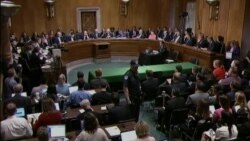A U.S. Senate panel has unanimously approved bipartisan legislation subjecting any final nuclear accord with Iran to congressional review and a potential vote approving or rejecting the deal.
Even before the 19-0 vote was cast in the Senate Foreign Relations Committee Tuesday, the White House cautiously endorsed the measure in its current form.
The bill would give Congress 30 days to review and vote on a nuclear agreement with Iran, if a final deal is reached. No sanctions on Iran enacted by Congress could be waived during that period.
In a concession to the White House and some wavering Democratic lawmakers, it omits specific stipulations on side issues, such as Iran’s support for terrorist groups and Israel’s right to exist. It does, however, mandate regular and frequent consultations between the administration and lawmakers on Iran’s compliance with any deal, and allows sanctions to be swiftly re-imposed if violations are detected.
“The sanctions that have been put in place by the Senate and by the House cannot be lifted without the administration bringing to us every detail of the deal, and then the clock will start,” said the committee’s chairman, Republican Senator Bob Corker. “Congress stays involved, and every 90 days the administration has to certify that, in every way, Iran is in compliance.”
Corker negotiated the bill’s final language with a high-ranking Democrat, Senator Ben Cardin.
“We’re involved here. We have to be involved here,” said Cardin. “Only Congress can permanently change or modify the sanctions regime which is clearly part of what the president is negotiating.”
The committee vote came hours after senators met behind closed doors with Secretary of State John Kerry and other top officials dispatched by President Barack Obama to urge congressional restraint. But even some Democrats most loyal to the White House emerged from the meeting saying Congress cannot be silent on an Iran nuclear deal.
“I think we should have a say in some way,” said Democratic Senator Debbie Stabenow.
That message appears to be getting through to the administration. At a briefing, White House spokesman Josh Earnest said President Obama will reserve judgment until a final bill is passed, but added, “What we have made clear to Democrats and Republicans in the Senate Foreign Relations Committee is that the president would be willing to sign the proposed compromise that is working its way through the committee today.”
Now, the bill goes before the full Senate, where Republican Majority Leader Mitch McConnell is expected to schedule a prompt vote. Similarly, House Speaker John Boehner has promised action once a bill clears the Senate.
Congress is asserting a role for itself before international negotiations with Iran conclude in June. Senator Corker has argued his bill will strengthen America’s bargaining position in the talks by making it clear that any deal reached will have to pass congressional muster.
Others have worried it could give Tehran an excuse to walk away from the negotiations entirely and shred the unity of western nations that imposed the international sanctions regime that helped bring Iran to the bargaining table.
Watch video report from VOA's Zlatica Hoke:






